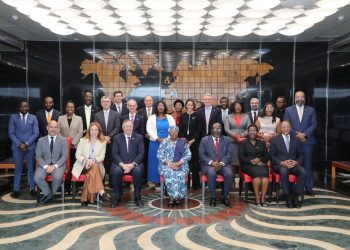
The Namibia Petroleum Operators Association (NAMPOA) says the government’s visa policies are imposing significant delays on oil and gas companies operating within the country.
The association said the delays, particularly in securing visas for specialised expatriates essential to critical operations like drilling, are hindering the industry’s progress.
NAMPOA Vice Chairperson Martin Negonga said the current visa structures, including work permits and renewals, are hindering the timely execution of projects, raising concerns about the long-term impact on the industry.
This comes as local expertise in these highly specialised tasks is still developing, and thus companies rely on foreign workers to maintain momentum.
“Drilling is one of the most highly specialised activities that oil and gas companies undertake. Unfortunately, in Namibia, we currently lack the skilled personnel capable of operating on some of these rigs. Therefore, companies are required to bring in expatriates with experience on these rigs to support these activities,” he said at the Namibia Oil & Gas Conference.
He said the visa challenges are particularly acute for time-sensitive operations like drilling, with the activities often having tight timelines, typically spanning just two to three months for some operators.
“Now, the way visas are structured—whether it’s a work permit, a working visa, a business visa, or otherwise—can hinder the progression of these activities. For example, a work permit is typically issued for 12 months, after which it must be renewed. This requirement can become a barrier because the activities must continue uninterrupted,” he said.
Negonga said the association has engaged with the Ministry of Mines and Energy and established contact with the relevant ministries such as the Ministry of Home Affairs, Immigration, Safety and Security to find a common solution.
“We have also involved our members in these discussions, requesting their input on potential recommendations. Some of these recommendations have been addressed to the ministry, and we have conveyed the challenges we face from that perspective,” he noted.
“We are hopeful that continued engagement with the ministry will help us build on the momentum we have started, ensuring we do not lose sight of our goals.”
This comes as over five rigs have actively been involved in oil exploration offshore Namibia, with TotalEnergies using two rigs and Galp Energia using one rig among others.
Several companies are currently conducting drilling activities in Namibia’s oil and gas sector, including Shell, QatarEnergy, ExxonMobil, Eco Atlantic, Reconnaissance Energy Africa, OMV and Murphy Oil Corporation.
These firms represent a mix of established oil majors and newer entrants, all contributing to the growing exploration landscape in the country.
The issues arise as Namibia has expanded its visa requirements to encompass 33 countries, following a government review that added two additional nations to the list.
In June Namibia resolved to introduce entry visa requirements for countries that have not reciprocated its visa exemption policy. Namibia had visa exemptions for around 55 nations, with only 18 of those having reciprocated the exemptions.







